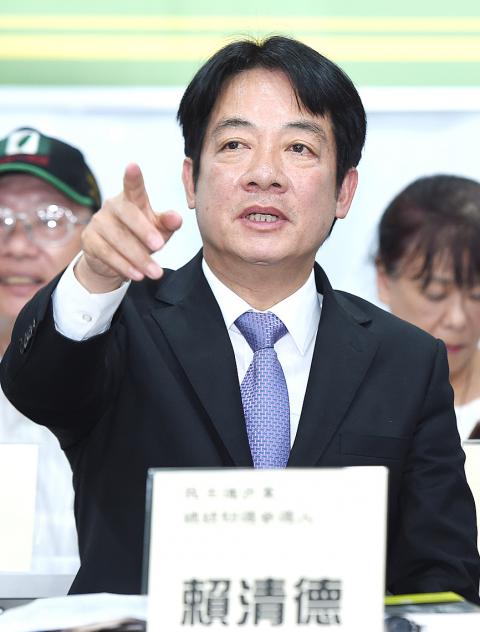Former premier William Lai (賴清德) yesterday urged the Democratic Progressive Party (DPP) to begin discussing its presidential primary and called for an “anti-annexation law” against China.
Lai said that when meeting with President Tsai Ing-wen (蔡英文), “there was no discussion on how to conduct a primary, only requests that I quit.”
“That is not the approach the DPP should take,” he added.

Photo: Liao Chen-huei, Taipei Times
If the party convenes a second meeting with him and Tsai, he hopes they will begin talking about a primary, Lai said.
He made the remarks at an event to oppose China’s annexation of Taiwan organized by a coalition of pro-independence groups in Taipei.
While the groups had invited primary candidates from all parties to share their view on countering the Chinese threat, only Lai attended, Taiwan Society chairman Chang Yeh-sen (張葉森) said.
Wu Hsiang-hui (吳祥輝), a political pundit, said he not only opposes China annexing Taiwan, but also opposes “President Tsai Ing-wen annexing Lai.”
Lai said that Tsai has so far not said she would support him if he won the primary, but has instead been making suggestions that someone should be running as a vice president,
“That is against the spirit of democracy,” Lai said, adding that a vice president should be determined after the primary.
“Emphasizing how someone should be a vice president during a primary is an election strategy not worth pursuing,” he said.
Since he has registered for the primary, he hopes to follow it through, Lai said.
As a democratic party, the DPP should adhere to its democratic procedures and allow primary candidates the opportunity to promote their platforms and lobby for support, he said.
“As a pragmatic political worker for Taiwanese independence, my national strategy is to promote stability in the nation and peace abroad,” he said.
To counter the Chinese Communist Party’s influence, the government should ensure the safety and sovereignty of Taiwan through increased collaboration with the US and other countries, he said.
It should also promote an anti-annexation law or anti-infiltration law, he said.
He urged people to think of the presidential and legislative elections next year as “a fight against China’s annexation and “one country, two systems” proposal, as well as a fight to ensure Taiwan’s sovereignty, human rights, and democratic and free way of life,” he said.
It would also be an opportunity to oppose a peace treaty with China, he said, adding that Beijing’s peace treaty with Tibet led to the exile of the Dalai Lama and the loss of many lives.
The experiences of Hong Kong and Tibet indicate that “the only path to happiness for Taiwan is independence and autonomy,” he said.
At a separate event in Taipei, Tsai told reporters that supporters would like to see Lai run as her vice president next year.
“One plus one is definitely bigger than two, and that is what our supporters hope to see,” she said.
Asked if she would like to meet with Lai soon, Tsai said she respects the party’s arrangements.
Asked about a rumor that the primary would be canceled due to pressure from her, the president said: “It is indeed a rumor — and a very malicious one.”

An essay competition jointly organized by a local writing society and a publisher affiliated with the Chinese Communist Party (CCP) might have contravened the Act Governing Relations Between the People of the Taiwan Area and the Mainland Area (臺灣地區與大陸地區人民關係條例), the Mainland Affairs Council (MAC) said on Thursday. “In this case, the partner organization is clearly an agency under the CCP’s Fujian Provincial Committee,” MAC Deputy Minister and spokesperson Liang Wen-chieh (梁文傑) said at a news briefing in Taipei. “It also involves bringing Taiwanese students to China with all-expenses-paid arrangements to attend award ceremonies and camps,” Liang said. Those two “characteristics” are typically sufficient

A magnitude 5.9 earthquake that struck about 33km off the coast of Hualien City was the "main shock" in a series of quakes in the area, with aftershocks expected over the next three days, the Central Weather Administration (CWA) said yesterday. Prior to the magnitude 5.9 quake shaking most of Taiwan at 6:53pm yesterday, six other earthquakes stronger than a magnitude of 4, starting with a magnitude 5.5 quake at 6:09pm, occurred in the area. CWA Seismological Center Director Wu Chien-fu (吳健富) confirmed that the quakes were all part of the same series and that the magnitude 5.5 temblor was

The brilliant blue waters, thick foliage and bucolic atmosphere on this seemingly idyllic archipelago deep in the Pacific Ocean belie the key role it now plays in a titanic geopolitical struggle. Palau is again on the front line as China, and the US and its allies prepare their forces in an intensifying contest for control over the Asia-Pacific region. The democratic nation of just 17,000 people hosts US-controlled airstrips and soon-to-be-completed radar installations that the US military describes as “critical” to monitoring vast swathes of water and airspace. It is also a key piece of the second island chain, a string of

The Central Weather Administration has issued a heat alert for southeastern Taiwan, warning of temperatures as high as 36°C today, while alerting some coastal areas of strong winds later in the day. Kaohsiung’s Neimen District (內門) and Pingtung County’s Neipu Township (內埔) are under an orange heat alert, which warns of temperatures as high as 36°C for three consecutive days, the CWA said, citing southwest winds. The heat would also extend to Tainan’s Nansi (楠西) and Yujing (玉井) districts, as well as Pingtung’s Gaoshu (高樹), Yanpu (鹽埔) and Majia (瑪家) townships, it said, forecasting highs of up to 36°C in those areas